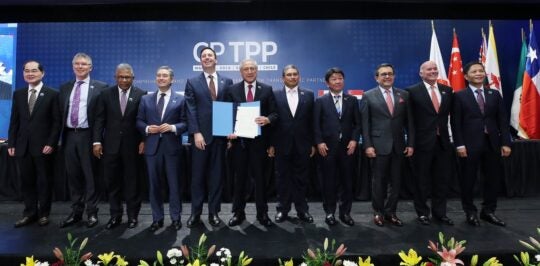On Wednesday, November 3, WITA and the Institute for International Economic Policy at George Washington University discussed the potential for the UK and China to join the Comprehensive and Progressive Agreement for Trans-Pacific Partnership (CPTPP).
WITA Webinar Featuring:
The Honorable Tim Groser, former Ambassador of New Zealand to the United States and the WTO, and New Zealand’s former Minister of Trade
Wendy Cutler, Vice President, Asia Society Policy Institute; former Acting Deputy United States Trade Representative
Shanker Singham, CEO, Competere; former Advisor, UK Secretary of State for International Trade; Member, DIT Trade and Agriculture Commission; Academic Fellow, Institute of Economic Affairs
Moderator: Jay Shambaugh, Professor of Economics and International Affairs, Director of the Institute for International Economic Policy at George Washington University, and former Member of the President’s Council of Economic Advisors
SPEAKER BIOGRAPHIES
Ambassador Tim Groser has since 2008 served as New Zealand’s Minister of Trade, Minister for Climate Change Issues and Associate Minister of Foreign Affairs.
Prior to his appointment as a Member of Parliament in 2005, Mr Groser held a range of senior trade and economic roles within the New Zealand civil service, including Chief Negotiator for New Zealand during the Uruguay Round from 1990 to 1994, Principal Economic Adviser to the New Zealand Ministry of Foreign Affairs and Trade from 1997-1999, and New Zealand Ambassador to the WTO from 2002-2005.
From 1994 to 1997 Mr Groser served as New Zealand Ambassador to Indonesia and from 1992-2002 was Chief Executive of the Asia-NZ Foundation.
This includes extensive experience within the GATT and WTO where he was appointed to a number of significant roles, including as Chair of the Rules and Agriculture Negotiations. In both international trade as well as a range of other international negotiations, Mr Groser has demonstrated his ability in promoting consensus solutions to a wide array of complex issues.
Mr Groser has throughout his career demonstrated his intimate appreciation of the multilateral trading system and remains committed to ensuring the WTO continues to play its essential role for the future.
Wendy Cutler is Vice President at the Asia Society Policy Institute (ASPI) and the managing director of the Washington, D.C. office. In these roles, she focuses on building ASPI’s presence in the nation’s capital and on leading initiatives that address challenges related to trade, investment, and innovation, as well as women’s empowerment in Asia. She joined ASPI following an illustrious career of nearly three decades as a diplomat and negotiator in the Office of the U.S. Trade Representative (USTR), where she also served as Acting Deputy U.S. Trade Representative. During her USTR career, she worked on a range of bilateral, regional, and multilateral trade negotiations and initiatives, including the U.S.-Korea Free Trade Agreement, the Trans-Pacific Partnership, U.S.-China negotiations, and the WTO Financial Services negotiations. She has published a series of ASPI papers on the Asian trade landscape and serves as a regular media commentator on trade and investment developments in Asia and the world.
Shanker Singham leads the International Trade and Competition Unit at the Institute of Economic Affairs. He is Chairman and CEO of Competere Group. He was formerly a Director at the Legatum Institute and the managing director of the Competitiveness and Enterprise Cities project at Babson Global. The Competitiveness and Enterprise Development (CED) Project at Babson Global works with developers and governments in developing countries to put in place the necessary regulatory environment and infrastructure that will spur economic growth through the creation of Enterprise Cities.
As one of the world’s leading trade and competition lawyers, he has worked on the privatisation of the UK electricity market, the transition of the Soviet, Central and Eastern European economies and the apertura in Latin America. He has worked on the accession of Poland and Hungary to the EU and the WTO accessions of a number of countries, including China and Russia. He led the global market access/WTO practices of Steel Hector and Davis in Miami, and Squire Sanders in Washington, DC. He has lived in London, Hong Kong, Miami, Washington, D.C., and Boston.
Jay Shambaugh is a Professor of Economics and International Affairs and Director of the Institute for International Economic Policy at George Washington University. Shambaugh’s area of research is macroeconomics and international economics. His work includes analysis of the interaction of exchange rate regimes with monetary policy, capital flows, and trade flows as well as studies of international reserves holdings, country balance sheet exchange rate exposure, the cross-country impact of fiscal policy, the crisis in the euro area, and regional growth disparities.
He has had two stints in public service. He served as a Member of the White House Council of Economic Advisors from 2015-2017. Earlier, he served on the staff of the CEA as a Senior Economist for International Economics and then as the Chief Economist. He also spent 3 years as the Director of the Hamilton Project at the Brookings Institution. He is also a Faculty Research Fellow at the NBER and Non-Resident Senior Fellow in Economic Studies at Brookings.
Prior to joining the faculty at George Washington, Shambaugh taught at Georgetown and Dartmouth and was a visiting scholar at the IMF. Shambaugh received his Ph.D. in economics from the University of California at Berkeley, an M.A. from the Fletcher School at Tufts, and a B.A. from Yale University.


